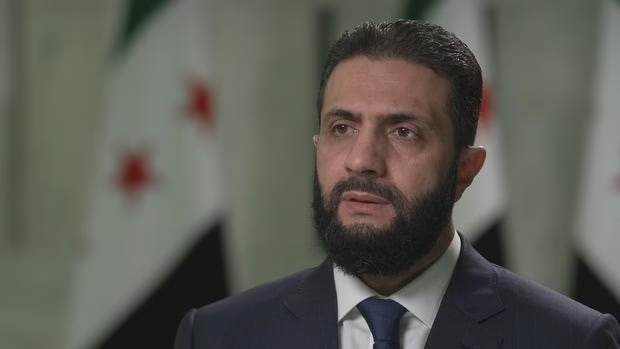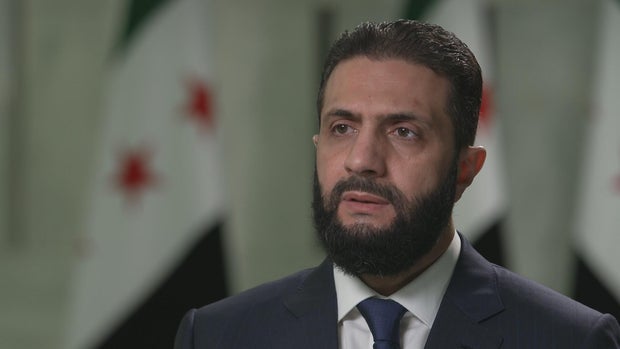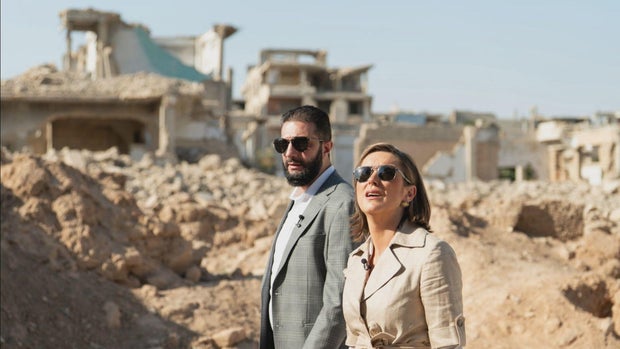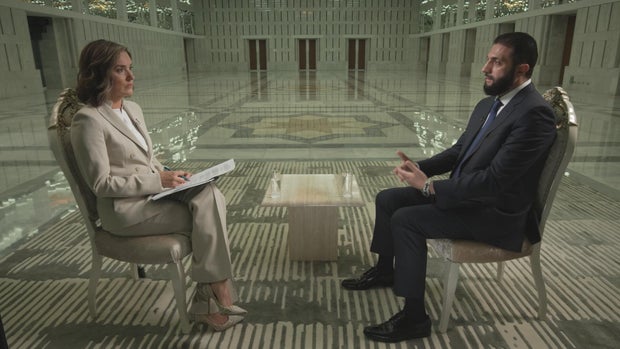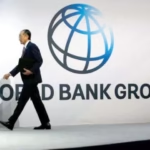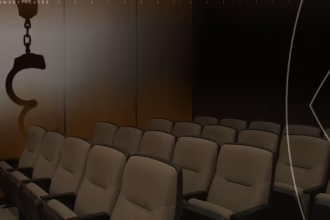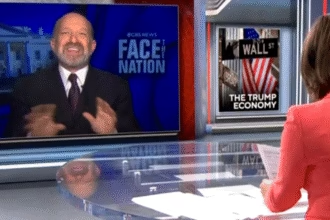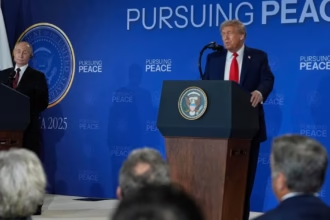At home and abroad, Syrian President Ahmed al-Sharaa, who once led an affiliate of al Qaeda and was designated as a terrorist by the U.S. in 2013, is facing questions over whether he can stabilize, unify and democratize a fractured and traumatized Syria.
He is encountering major challenges, including rebuilding devastated communities, protecting minorities from persecution, and getting oppressive economic sanctions permanently lifted. If al-Sharaa can follow through on his promises, it would be a new day for Syria and for the Middle East.
“Syria deserves to live in peace and security, and the world will benefit from Syria’s new situation,” al-Sharaa said. “It is a great historical opportunity for the region.”
Ahmed al-Sharaa’s path from al Qaeda to president of Syria
About 20 years ago, al-Sharaa left an upper-middle-class life in Syria to join al Qaeda in Iraq . He wouldn’t elaborate on what he did during his time in Iraq but he was arrested in 2005 and spent six years in American and Iraqi prisons.
Al-Sharaa was released from prison in 2011, just as a popular uprising against the dictator and then-Syrian President Bashar al-Assad had begun. He started an al Qaeda affiliate in Syria that staged suicide bombings and armed attacks against the Assad regime.
“We did not take any external actions outside Syrian territory. We did not target anyone but the Syrian regime,” al-Sharaa said.
60 Minutes
But the U.S. stated that many of the attacks killed “innocent Syrian civilians.” The U.S. designated al-Sharaa a global terrorist and put his face, with the assumed name he was using at the time — Abu Mohammad al-Jolani — on a wanted poster. A $10 million reward was offered to anyone who could help “stop this terrorist.”
He eventually broke ties with a former ally, the founder of the terror group ISIS, and in 2016, al-Sharaa renounced his allegiance to al Qaeda.
“If I had agreed with them, I would not have left them,” he said.
In November 2024, al-Sharaa’s Islamist forces launched a surprise attack on Aleppo. They took the ancient city, and kept going. By the time they got to the capital, Damascus, Assad had fled to Moscow.
Al-Sharaa’s forces ended 54 years of the Assad family’s tyrannical rule in just 11 days.
In December, al-Shaara proclaimed a new and free Syria. Leaders of the militias that toppled Assad appointed him as president of Syria the following month.
60 Minutes sat down with al-Sharaa for his first American television interview since becoming president.
“Entering this palace wasn’t a very positive experience,” al-Sharaa said of his first time walking into the presidential palace once occupied by Assad. “Much evil towards the Syrian people came out of this palace.”
Rebuilding Syria
Today, about 13 million Syrians, half the country’s population, are internally displaced or living abroad as refugees. Over half a million people died during nearly 14 years of civil war from 2011 to 2024.
Rebel-held areas were destroyed by Assad and his allies, Russia and Iran.
“There are entire generations that have suffered tremendous psychological trauma,” al-Sharaa said.
60 Minutes
Syria’s new president said it’s important to give people hope for rebuilding and returning to their homes. Standing in the destroyed community of Jobar, on the outskirts of Damascus, al-Sharaa, who has young children, said he believes the area will be rebuilt in their lifetimes.
“The Syrian people are strong,” al-Sharaa said.
Ten months after the fall of the Assad regime, 60 Minutes saw signs of normalcy and difficulty, uncertainty and hope. In Damascus, one of the world’s oldest cities, the bazaar still bustles, and the faithful still come to pray at the Umayyad mosque, as they have for 13 centuries.
Bashar Assad’s face is still on Syria’s highly devalued currency — a brick of it is needed to buy dinner.
Many Syrians have electricity and running water for just a few hours a day.
Al-Sharaa said it will cost $600-900 billion to rebuild his country, and that’s going to require the international community’s help.
“The world watched this tragedy unfold for 14 years and couldn’t do anything to stop this massive crime,” he said. “So, the world today should provide support to Syria.”
Syria’s place in the world
The country’s woes are the result of the long civil war, but also harsh economic sanctions imposed by the U.S. and other countries to punish Assad for human rights abuses. Al-Sharaa wants all sanctions lifted.
“Anyone who obstructs the lifting of sanctions on Syria is an accomplice to those who committed this crime,” al-Sharaa said.
In May, when al-Sharaa met with President Trump in Saudi Arabia, Trump announced a bold, but provisional step toward lifting sanctions.
Last month, al-Sharaa spoke at the United Nations General Assembly in New York — the first Syrian leader to do so since 1967. Al-Sharaa is seeking long-term investment in Syria, and he still needs the U.S. to repeal sanctions permanently, which some lawmakers are reluctant to do.
At the U.N., China and Russia would need to vote in favor of lifting terrorism sanctions against al-Sharaa and the rebel group he led.
Al-Sharaa personally welcomed a high-level delegation from Moscow to Syria last month, a remarkable development given that the Russian air force helped Assad pummel parts of Syria. Al-Sharaa said he still intends to use legal means to pursue justice against Assad, who is living in Moscow since fleeing Syria. In September, a Syrian judge issued a warrant for Assad’s arrest.
“However, engaging in a conflict with Russia right now would be too costly for Syria,” al-Sharaa said. said. “Nor would it be in the country’s interest.”
Syria’s place in the Middle East
New sectarian violence at home has raised questions about whether al-Sharaa can control the fighters who helped bring him to power. On Syria’s western coast in March, his security forces and allied militia were accused of participating in the massacre of 1,500 civilians, most of them members of the Alawite community that was loyal to Assad.
The United Nations says al-Sharaa’s security forces violated humanitarian law.
“I believe this is an exaggerated description,” al-Sharaa said. “And I believe that Syria is committed to prosecuting anyone who committed crimes against civilians, of any party or side.”
60 Minutes
In July, during a fight between ethnic groups, al-Sharaa’s security forces and Bedouin tribe militia were accused of executing unarmed members of the minority Druze community in the southern city of Sweida.
Israel, which has Druze citizens too, bombed Syria’s army headquarters and defense ministry in response. Israel also bombed the grounds of his presidential palace twice, al-Sharaa said, once when he was close by.
“To target the palace to convey a message, that’s not a message, that’s a declaration of war,” he said. “But Syria doesn’t want to engage in wars, and it doesn’t want to be a threat to Israel or anyone else.”
Israel says it acted to protect the Druze people. Prime Minister Benjamin Netanyahu said he had to protect them because al-Sharaa’s forces were not.
“This is a Syrian internal matter that should be resolved legally by Syrian authorities,” al-Sharaa said.
After Assad fell, Israel occupied strategic parts of its shared border with Syria and conducted air raids and land incursions, citing potential security threats. President Trump’s Special Envoy to Syria, Tom Barrack, has been trying to broker an agreement that would ease tensions.
“Israel must retreat from any point taken after December 8th,” al-Sharaa said, describing his negotiating position. “Syria has not provoked Israel since we arrived in Damascus.”
Meanwhile, this past week, parliamentary elections were held in much of Syria, but only a limited number of people were eligible to vote. Under an interim constitution that al-Sharaa signed in March, he’s supposed to serve as president for five years, leading a transition to elected government.
He said general elections will be held once the country’s infrastructure is rebuilt and the population has IDs and proper documents. Al-Sharaa said he wants Syria to be a place where every person gets a vote.
Margaret Brennan, Andy Court, Annabelle Hanflig, and Omar Abdulkader did reporting in Syria for this story.


